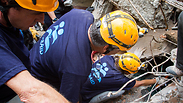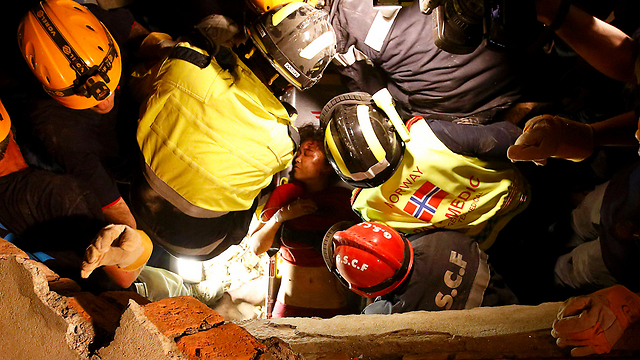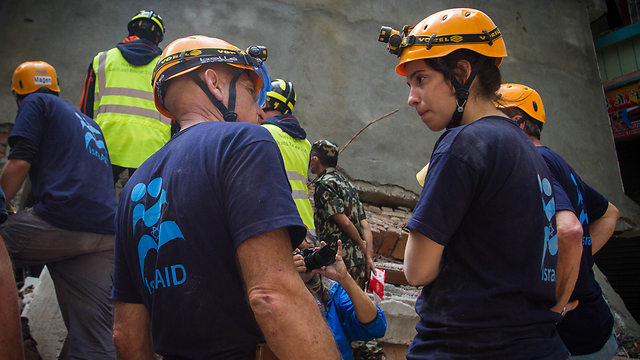
Yotam Politzer, who works for the non-profit NGO IsraAID, was one of the Israelis who joined a search and rescue team, which also included representatives from France and Norway, find the woman. "It's possible to find people still alive, just like we found her after 130 hours. The Nepalese are a strong people and we will do everything we can to find survivors," said Politzer.
Krishna Kumari, the 24 year-old Nepalese woman they saved, had survived the earthquake but was trapped under rubble for five days. She had been working in the kitchen of a hostel in Kathmandu at the time the earthquake hit.
"There were 130 people involved in the rescue of the Nepalese woman – 15 Israelis included. We were working at the site for two days. Everything started when a young girl came up to us and pleaded that we come because she thought there were people alive at the site.
"On the first day we found two bodies. We came the next day and used a machine called a 'life scanner' that identifies signs of life.
"All of a sudden we identified a heart beating. We could not believe it. We decided to check further and were able to hear breathing. I went inside and started yelling in Nepalese if someone was alive. To my surprise I heard a voice respond. She said 'Doka Che' which mean 'I'm in pain' in Nepalese," recounted Politzer.
Inbal Bustan, one of the four Israeli women who were part of the search and rescue team, recounted the rescue. "I was next to her the entire time. I stroked her and tried to calm her down," said Bustan.
A Nepalese army officer said that Kumari "looked injured, but conscious, and she spoke." The officer also said that Kumari had been transferred to a military hospital.
"We spoke to her and she said she was trapped and could not move a millimeter. We lowered a Jewish-Mexican doctor who works with us, who gave her fluids and managed to stabilize her. Slowly, we dug gently, a process that took a long time.
"She survived because above her was the corpse of the uncle of the young girl who had called us to the site. He had learned agriculture in Israel in the past. Her uncle died but he probably blocked the stones from crushing the young woman who we saved and created an air pocket which probably enabled her to survive," said Politzer.
"It took almost five hours until we were able to get her out. (She had) injuries all over her body but she was not in life-threatening danger. We took her to the IDF's field hospital and returned to the site because we thought there might be more signs of life," he said.
According to Politzer, saving Kumari's life made the strenuous work of search and rescue worth it. "The crew works like crazy, with high adrenaline and in very dangerous conditions," he said.
"We are in shock," he explained. "We have not internalized what has happened. I met her family and they were all in tears and very emotional. It is a feeling of great pride and emotion and I hope that we will be able to rescue more. I'm usually a naturally skeptic person but I'm putting aside my skepticism and now believe anything is possible," added Politzer.


















